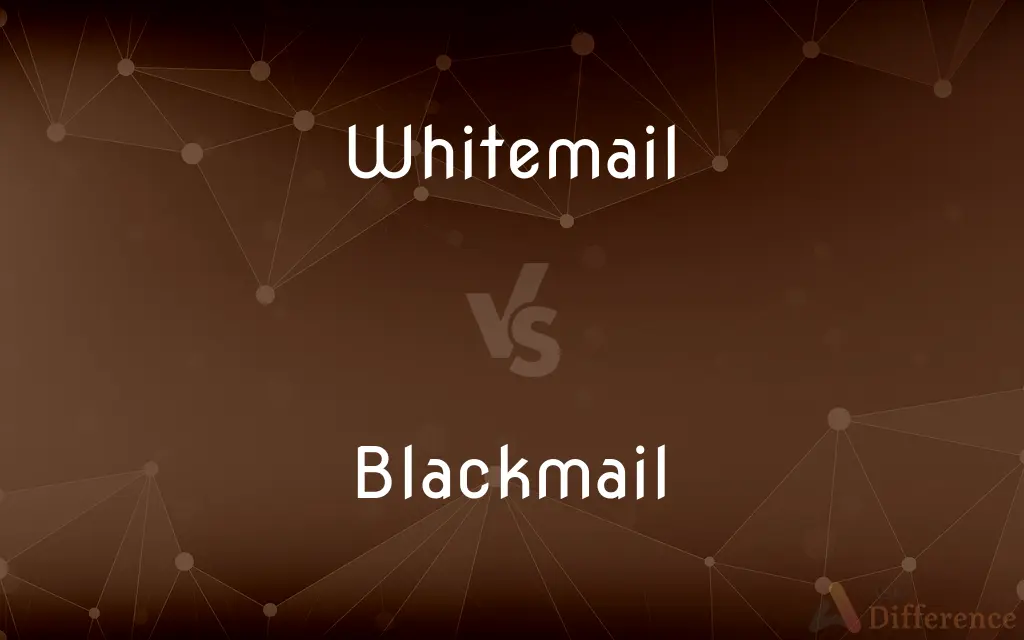Whitemail vs. Blackmail — What's the Difference?
Edited by Tayyaba Rehman — By Urooj Arif — Updated on April 2, 2024
Whitemail involves defensive corporate strategies against takeovers, while blackmail is coercing someone by threatening to reveal secrets.

Difference Between Whitemail and Blackmail
Table of Contents
ADVERTISEMENT
Key Differences
Whitemail is a strategy used by companies facing a hostile takeover bid, where they attempt to make the acquisition less attractive to the potential buyer. This can involve tactics like issuing new shares to dilute the bidder's potential stake. Blackmail, on the other hand, is an act of coercion, often involving threats to disclose personal or sensitive information unless demands, typically for money or other benefits, are met.
While whitemail is a term specific to the corporate and financial world, representing a defensive maneuver within legal boundaries, blackmail is a criminal offense. Blackmail involves exploiting private information for personal gain or to force someone into acting against their will.
Companies may resort to whitemail as part of a broader strategy to protect their independence and current management's interests, leveraging financial mechanisms to ward off unwelcome takeover attempts. Conversely, blackmail targets individuals or entities, leveraging secrecy and fear to extract payment or force action, relying on the victim's desire to maintain privacy or avoid scandal.
The motivations behind whitemail and blackmail are distinctly different; whitemail aims to preserve a company's autonomy and existing management structure, while blackmail seeks to exploit the vulnerabilities of individuals or organizations for personal gain.
Understanding the distinctions between whitemail and blackmail highlights the varied contexts in which these strategies are employed. Whitemail reflects a corporate strategy within the legal framework of business operations, whereas blackmail is a criminal act that manipulates the personal vulnerabilities of individuals or entities.
ADVERTISEMENT
Comparison Chart
Definition
A strategy to thwart hostile takeovers by making the company less attractive to the bidder.
Coercing someone by threatening to reveal embarrassing or harmful information unless demands are met.
Context
Corporate finance and strategy.
Criminal law.
Objective
To protect a company from a takeover and preserve its current management.
To gain money, favors, or force certain actions by exploiting secrets.
Legal Status
Legal and involves financial tactics.
Illegal and considered a criminal offense.
Mechanism
Issuing new shares, selling valuable assets, or other financial maneuvers.
Threatening to disclose sensitive or personal information.
Compare with Definitions
Whitemail
A method companies use to protect against hostile takeovers.
To prevent the takeover, the company employed whitemail by selling off its most profitable assets.
Blackmail
Blackmail is illegal and subject to criminal prosecution.
The businessman faced charges of blackmail, with potential penalties including prison time.
Whitemail
These actions are monitored under corporate law and governance standards.
Their whitemail tactic was carefully planned to comply with all legal requirements for shareholder treatment.
Blackmail
Relies on the victim's fear of damaging revelations.
Through blackmail, she demanded hush money to keep quiet about the affair.
Whitemail
Tactics include issuing new shares or assets.
The board decided on a whitemail strategy, issuing new shares to dilute the bidder's stake.
Blackmail
Victims are placed in a position where compliance seems the only way out.
Fearing public scandal, the actor complied with the blackmail demands, hoping to avoid media exposure.
Whitemail
Focuses on maintaining the status quo within the company.
Whitemail was the chosen path to ensure the CEO and current management team retained control.
Blackmail
Using threats to force someone into giving money or favors.
He was arrested for blackmail after threatening to release sensitive emails unless paid.
Whitemail
Employed in scenarios of unsolicited takeover attempts.
Facing an aggressive bid, the company resorted to whitemail, making itself less attractive to the aggressor.
Blackmail
Anyone can be a victim, from private individuals to large corporations.
The corporation was a target of blackmail, with demands made for financial compensation in exchange for silence.
Whitemail
Whitemail, coined as an opposite to blackmail, has several meanings.
Blackmail
Blackmail is an act of coercion using the threat of revealing or publicizing either substantially true or false information about a person or people unless certain demands are met. It is often damaging information, and may be revealed to family members or associates rather than to the general public.
Whitemail
(business) A tactic to resist hostile takeover, in which the target company sells discounted stock to a friendly third party.
Blackmail
The action, treated as a criminal offence, of demanding money from someone in return for not revealing compromising information which one has about them
She recounted the blackmail threats
They were acquitted of charges of blackmail
Whitemail
Persuasion based on positive rather than negative effects.
Blackmail
Demand money from (someone) in return for not revealing compromising information about them
They use this fact to blackmail him, trying to force him to vote for their candidate
Whitemail
To persuade.
Blackmail
Extortion of money or something else of value from a person by the threat of exposing a criminal act or discreditable information.
Whitemail
(ironic) Of a white person: to carry out blackmail.
Blackmail
Something of value, especially money, extorted in this manner
Refused to pay blackmail.
Blackmail
Tribute formerly paid to freebooters along the Scottish border for protection from pillage.
Blackmail
The extortion of money or favours by threats of public accusation, exposure, or censure.
Blackmail
(archaic) A form of protection money (or corn, cattle, etc.) anciently paid, in the north of England and south of Scotland, to the allies of robbers in order to be spared from pillage.
Blackmail
Black rent, or rent paid in corn, meat, or the lowest coin, as opposed to white rent, which was paid in silver.
Blackmail
Compromising material that can be used to extort someone, dirt.
Blackmail
(transitive) To extort money or favors from (a person) by exciting fears of injury other than bodily harm, such as injury to reputation, distress of mind, false accusation, etc.
He blackmailed a businesswoman by threatening to expose an alleged fraud.
Blackmail
(Kenya) To speak ill of someone; to defame someone.
Blackmail
A certain rate of money, corn, cattle, or other thing, anciently paid, in the north of England and south of Scotland, to certain men who were allied to robbers, or moss troopers, to be by them protected from pillage.
Blackmail
Payment of money exacted by means of intimidation; also, extortion of money from a person by threats of public accusation, exposure, or censure.
Blackmail
Black rent, or rent paid in corn, flesh, or the lowest coin, a opposed to "white rent", which paid in silver.
Blackmail
To extort money from by exciting fears of injury other than bodily harm, as injury to reputation, distress of mind, etc.; as, to blackmail a merchant by threatening to expose an alleged fraud.
Blackmail
Extortion of money by threats to divulge discrediting information
Blackmail
Exert pressure on someone through threats
Blackmail
Obtain through threats
Common Curiosities
How does whitemail work?
It often involves financial tactics like issuing new shares or selling off valuable assets.
What is blackmail?
Blackmail is the act of coercing someone by threatening to reveal sensitive or damaging information unless demands are met.
Is whitemail legal?
Yes, whitemail is legal and involves strategies within the framework of corporate governance.
What is whitemail?
Whitemail is a corporate strategy used to prevent hostile takeovers by making the company less attractive to potential bidders.
Are there legal protections against blackmail?
Yes, the law provides protections against blackmail, with legal repercussions for those found guilty.
What role do ethics play in whitemail and blackmail?
Whitemail operates within legal bounds but raises ethical questions, while blackmail is both illegal and unethical.
Why is blackmail illegal?
Blackmail is illegal because it exploits individuals' privacy and freedom, coercing them through fear and intimidation.
Can a company be a victim of blackmail?
Yes, companies can also be targeted by blackmail if there is sensitive information that could harm their reputation or financial standing.
What distinguishes whitemail from blackmail?
Whitemail is a legal corporate defense strategy, while blackmail is a criminal act of coercion.
Can whitemail strategies backfire?
Yes, if not carefully executed, whitemail strategies can negatively impact shareholder value and company reputation.
How do victims respond to blackmail?
Responses vary, but seeking legal advice and contacting law enforcement are common steps.
Is it possible to negotiate with a blackmailer?
While some may attempt negotiation, it's risky and can escalate the situation; legal advice is recommended.
What should individuals do if threatened with blackmail?
Individuals should not comply with demands and should seek legal assistance and report the threat to authorities.
Can whistleblowing be considered blackmail?
No, whistleblowing exposes wrongdoing for public interest, unlike blackmail, which seeks personal gain.
How do companies decide to use whitemail?
Companies weigh the benefits and risks, considering shareholder value and long-term impacts.
Share Your Discovery

Previous Comparison
Biryani vs. Curry
Next Comparison
Garland vs. TinselAuthor Spotlight
Written by
Urooj ArifUrooj is a skilled content writer at Ask Difference, known for her exceptional ability to simplify complex topics into engaging and informative content. With a passion for research and a flair for clear, concise writing, she consistently delivers articles that resonate with our diverse audience.
Edited by
Tayyaba RehmanTayyaba Rehman is a distinguished writer, currently serving as a primary contributor to askdifference.com. As a researcher in semantics and etymology, Tayyaba's passion for the complexity of languages and their distinctions has found a perfect home on the platform. Tayyaba delves into the intricacies of language, distinguishing between commonly confused words and phrases, thereby providing clarity for readers worldwide.
















































